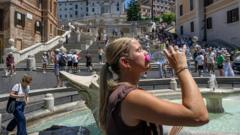The upcoming referendum proposes reducing the citizenship application timeframe in Italy from ten to five years, yet political resistance and a lack of public support threaten voter turnout. Activists stress the emotional toll of being excluded from the citizenship process, as many long-term residents continue to grapple with identity and belonging in a nation they call home.
Italy's Citizenship Referendum Sparks Controversy Amid Growing Division

Italy's Citizenship Referendum Sparks Controversy Amid Growing Division
A national referendum aimed at reforming Italy’s citizenship law has ignited intense debate and division within the country, highlighting the struggles of long-term residents seeking recognition.
Sonny Olumati was born in Rome and has lived in Italy all his life, yet he is still denied citizenship. At 39 years old, the artist identifies Italy as his home, yet bureaucracy sees him merely as a Nigerian national, limited to the constraints of his residence permit. "Not having citizenship is like... being rejected from your country," Sonny expresses, urging for change through a "Yes" vote in the upcoming national referendum. This vote, set for Sunday and Monday, proposes shortening the citizenship application process from ten to five years, aligning Italy with the more flexible policies of many European nations.
However, reactions are varied. Prime Minister Giorgia Meloni has openly declared her intention to boycott the referendum, describing the current citizenship law as "excellent" and dismissing calls for change. Some political factions aligned with her administration have even encouraged Italians to spend their voting days at the beach rather than at polling stations. Ironically, Sonny will also abstain from the vote as non-citizens like him are denied the right to participate.
The referendum addresses a sensitive and charged issue around the definition of Italian identity. Each year, Italy welcomes a significant number of migrants and refugees, often through dangerous sea routes from North Africa, while Meloni's administration has prioritized reducing these arrivals. This referendum is focused specifically on a group already well-integrated into society: long-term foreign residents contributing to the workforce in various sectors. Carla Taibi of the liberal party More Europe emphasizes that the reform does not change the criteria for citizenship, only hastens the application for those who have lived and worked in Italy for an extended period.
Currently, as many as 1.4 million long-term residents could be eligible for faster citizenship, impacting both their own lives and those of their eligible children. Increased citizenship could bolster Italy's increasingly aging population, providing a fresh demographic boost.
Meloni and her government allies have downplayed the vote's significance, with Italian state media reporting little on the initiative. "This tactic may be strategic; they want to avoid raising awareness to prevent reaching the required voter turnout of over 50%," observes Professor Roberto D'Alimonte of Luiss University. While Meloni finally acknowledged the referendum by stating she might visit a polling station, she affirmed she would not cast a vote, highlighting her dissent.
Italian statistics showcase that the country granted citizenship to 217,000 individuals in 2022, a statistic touted by Meloni. However, a substantial number of these were granted to Argentines of Italian descent, many of whom may never visit Italy, intensifying frustrations among long-term residents like Sonny.
Activists, including Sonny and fellow campaigner Insaf Dimassi, argue that the citizenship criteria are steeped in biases that impact people of color disproportionately. An individual with a complicated citizenship application process for over two decades, Sonny labels the situation "racism." Insaf, a PhD student, echoes this sentiment, recalling the moment she realized she was considered an outsider during a mayoral election candidate opportunity. "Being denied representation is synonymous with invisibility,” she states, highlighting the emotional toll of exclusion.
On the eve of the referendum, students in Rome rallied by painting a call to vote in support of the reform on city pavements. Yet, with limited promotion of the referendum and a management strategy designed to suppress turnout, the likelihood of a successful vote remains uncertain. Regardless of the outcome, Sonny maintains a hopeful perspective. "Even if they vote 'No', we will stay here - and consider our next steps," he insists. "We must continue the conversation about our community's place in this nation."






















